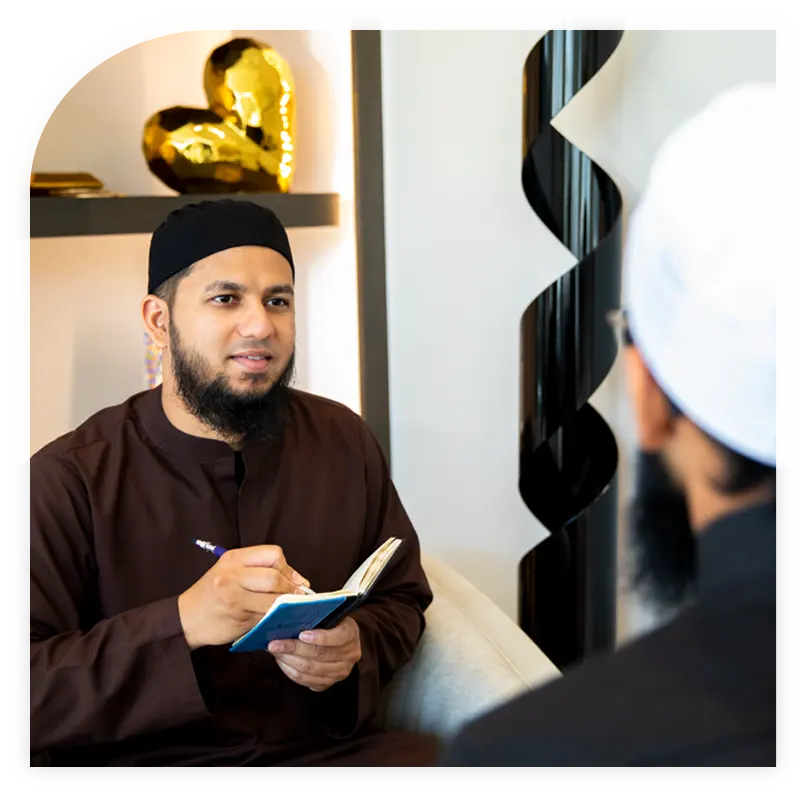Anger is a universal emotion, an innate response to situations that challenge our expectations or desires. It’s a natural part of being human, yet how we handle it varies significantly from person to person. For many, anger manifests aggressively, while others are able to find a calm approach. Regardless of status, nationality, or ethnicity, everyone feels anger at some point in their life. However, within Islamic therapy and Online Muslim Therapists, a wealth of practical guidance exists on managing this powerful emotion.
In this blog, we will explore the nature of anger and its impacts. We will then delve into the therapeutic approaches Islam offers to help Muslims effectively manage and navigate their emotions.
Introduction to Islamic Therapy
Anger management and Islamic therapy, which is grounded in the principles of Islam, presents a distinctive pathway toward healing and well-being. By comprehending its fundamental principles, individuals can navigate towards seeking support from online Muslim therapists in a manner that resonates with their religious and cultural values.
Here are some common reasons why people experience anger:
➡️ Frustration
When things don’t go as planned or expected, it can lead to frustration, which may manifest as anger.
➡️ Feeling Disrespected
Being treated unfairly or disrespectfully by others can trigger feelings of anger.
➡️ Stress
High stress levels can lower one’s tolerance for frustration, making one more prone to anger outbursts.
➡️ Injustice
Witnessing or experiencing injustice, personal or societal, can evoke intense anger.
➡️ Hurt or Betrayal
Being hurt or betrayed by someone close can ignite intense anger and resentment.
➡️ Fear
Anger can sometimes be a defense mechanism in response to feeling threatened or vulnerable.
➡️ Lack of Control
Feeling powerless or powerless over a situation can lead to frustration and anger.
➡️ Pain
Physical or emotional pain can amplify anger, as it may be perceived as unfair or unjust.
➡️ Unmet Needs
When our needs aren’t met or understood, it can lead to frustration and anger.
➡️ Miscommunication
Poor communication or misunderstandings can lead to conflict and anger between individuals.
➡️ Past Trauma
Past experiences of trauma or abuse can contribute to heightened anger responses in certain situations.
➡️ Jealousy
Feeling jealous of others’ success or possessions can trigger anger and resentment.
➡️ Perceived Threats
Perceiving a threat to oneself or loved ones can activate the body’s fight-or-flight response, leading to anger.
➡️ Personal Expectation
Feeling disappointed or let down when our expectations aren’t met can result in feelings of anger.
➡️ Cultural or Societal Norms
Cultural or societal norms that promote aggression or intolerance can influence how individuals express and perceive anger.
Online Muslim Therapists
Muslim therapists integrate Islamic principles, teachings, and practices with psychological interventions to address mental health concerns like anger. Moreover, they emphasize the comprehensive approach to healing, encompassing human existence’s spiritual, emotional, and physical dimensions.
Importance of Seeking Islamic Therapy from a Culturally Sensitive and Religiously Informed Perspective
For Muslims, seeking therapy from a culturally sensitive and religiously informed perspective is crucial. It ensures that individuals receive support that respects their beliefs, cultural values, and practices. This fosters a sense of trust and comfort in the therapeutic process.
10 Effective Anger Management Techniques for Muslim clients:
✅ Seeking Refuge in Allah (God)
Encourage individuals to pray and seek refuge in Allah during moments of anger. Remind them of the power of supplication (dua) in finding inner peace and strength.
✅ Practicing Patience (Sabr)
Emphasize the Islamic value of patience in anger-provoking situations. Encourage individuals to cultivate patience through daily reminders, reflecting on Quranic verses and Ahadith related to sabr.
✅ Engaging in Dhikr (Remembrance)
Suggest incorporating dhikr (remembrance of Allah) into daily routines, especially during moments of anger. Reciting phrases such as “Subhan Allah” (Glory be to Allah) or “Astaghfirullah” (I seek forgiveness from Allah) can help calm the mind and control emotions.
✅ Utilizing Breathing Exercises
Teach deep breathing techniques derived from Islamic practices such as “Tasbih Breathing,” where individuals synchronize deep breaths with the recitation of tasbih (glorification of Allah). This helps calm the nervous system and reduces anger.
✅ Practicing Gratitude
Encourage individuals to focus on gratitude by regularly reflecting on blessings from Allah. Gratitude journaling or reciting specific prayers of thankfulness can shift focus away from anger towards appreciation.
✅ Engaging in Physical Exercise
Recommend engaging in physical activities such as walking, jogging, or practicing martial arts as permissible within Islamic guidelines. Physical exercise helps release pent-up energy and tension, reducing the likelihood of explosive anger outbursts.
✅ Seeking Social Support
Encourage individuals to seek support from family, friends, or community members when dealing with anger. Remind them of the importance of surrounding themselves with positive influences who can provide guidance and perspective.
✅ Engaging in Constructive Communication
Teach practical communication skills rooted in Islamic teachings, such as speaking with kindness and patience (Hikmah) and avoiding harsh words. Encourage active listening and seeking mutual understanding in resolving conflicts.
✅ Engaging in Self-Reflection
Encourage individuals to engage in regular self-reflection (Muhasabah) to identify triggers and patterns of anger. Islamic teachings emphasize the importance of introspection and accountability in personal development.
✅ Seeking Professional Help
Remind individuals that seeking professional help, such as therapy or counseling, is valid and encouraged in Islam. Recommend therapists who understand Islamic values and can provide culturally sensitive support in managing anger.
Ahadith About Anger Management
In Islam, managing anger is highly emphasized as it can lead to harmful consequences. The Prophet Muhammad (peace be upon him) taught that controlling anger signifies strength and righteousness. There are numerous Ahadith (sayings of the Prophet) that address anger management, including:
“The strong person is not the one who can overpower others (in wrestling); rather, the strong person is the one who controls himself when he is angry.” (Sahih al-Bukhari)
“If one of you becomes angry while standing, then he should sit down. If the anger leaves him, well and good; otherwise, he should lie down.” (Sunan Abi Dawud)
“Do not become angry, and paradise will be yours.” (Sunan at-Tirmidhi)
These teachings emphasize the importance of maintaining patience and self-control, even in moments of provocation. Islam encourages individuals to seek refuge in prayer and supplication when angry and strive for forgiveness and reconciliation with others. Managing anger through individual coaching can lead to peace of mind, harmonious relationships, and spiritual growth.
FAQ”s
How do Muslim therapists incorporate Islamic teachings into therapy?
Muslim therapists integrate Islamic teachings, such as Quranic verses and Prophetic traditions, into therapy sessions to provide spiritual guidance and support.
Are there specific anger management techniques recommended in Islam?
Muslim mental health is essential, and Islam emphasizes patience, forgiveness, and seeking refuge in Allah as key components of anger management. Therapists may also teach clients mindfulness, deep breathing, and conflict resolution techniques grounded in Islamic principles.
How can I find a Muslim therapist in my area?
Individuals can use online directories, referrals from community members, and research to find Muslim therapists who meet their needs.
Is therapy culturally sensitive to the needs of Muslim individuals?
Culturally competent therapists strive to understand and address the unique cultural and religious needs of Muslim clients, ensuring therapy is sensitive and effective.
What are some common mental health issues faced by the Muslim community?
Common mental health issues in the Muslim community include depression, anxiety, anger, trauma-related disorders, and acculturation stress.
Are there online resources available for Muslim mental health support?
Yes, there are online forums, helplines, and educational resources dedicated to providing mental health support to Muslim individuals.
Can non-Muslims also seek therapy from Muslim therapists?
Yes, Muslim therapists provide therapy to individuals of all faiths and backgrounds, respecting diversity and promoting inclusivity.
How does spirituality play a role in Muslim therapy sessions?
Spirituality is often integrated into therapy sessions, offering clients comfort, strength, and guidance in navigating their mental health journey.
Are there specific support groups for Muslim individuals dealing with anger issues?
Some organizations offer support groups and workshops tailored to Muslim individuals seeking assistance with anger management and emotional regulation.
What are some tips for breaking the stigma surrounding mental health in Muslim communities?
Educating community members, promoting open discussions, and sharing subjective experiences can help break the stigma surrounding mental health in Muslim communities, fostering understanding and acceptance.
Anger Management through Individual Coaching:
Experience the transformative power of Ihsan Coaching, where individual coaching and religious consultation come together to support your mental health and spiritual well-being. Our comprehensive approach integrates psychological principles with Islamic teachings, providing personalized guidance and support tailored to your needs.
Don’t wait any longer to prioritize your mental health and spiritual development. Reach out to Ihsan Coaching and embark on a path of self-discovery, empowerment, and transformation.










